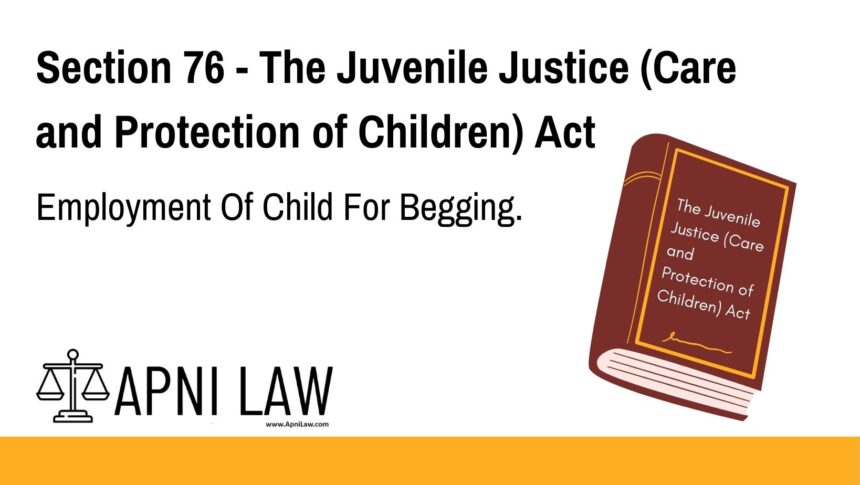Code: Section 76 of The Juvenile Justice (Care and Protection of Children) Act
76.
(1) Whoever employs or uses any child for the purpose of begging or causes any child to beg shall be punishable with imprisonment for a term which may extend to five years and shall also be liable to fine of one lakh rupees.
Provided that, if for the purpose of begging, the person amputates or maims the child, they shall be punishable with rigorous imprisonment for a term not less than seven years which may extend up to ten years, and shall also be liable to a fine of five lakh rupees.
(2) Whoever, having the actual charge of, or control over the child, abets the commission of an offence under sub-section (1), shall be punishable with the same punishment as provided for in sub-section (1) and such person shall be considered to be unfit under sub-clause (v) of clause (14) of Section 2.
Provided that, the said child shall not be considered a child in conflict with law under any circumstances, and shall be removed from the charge or control of such guardian or custodian and produced before the Committee for appropriate rehabilitation.
Explanation of Section 76
Section 76 of the Juvenile Justice (Care and Protection of Children) Act addresses the serious issue of employing children for begging. It imposes stringent penalties for anyone who uses a child for begging or causes a child to beg. The law also introduces severe punishments if the child is maimed or harmed for the purpose of begging. This is a crucial provision to ensure that children are not exploited for such inhuman practices.
If a person in charge of the child, such as a guardian or custodian, is found to be abetting this act of exploitation, they face the same penalties and are deemed unfit to care for the child. The child is then removed from the custody of the abuser and placed under the care of the Committee for rehabilitation.
Illustration
Example 1: A Person Using a Child for Begging
A person is caught forcing a child to beg on the streets. The person is found guilty under Section 76(1) and sentenced to imprisonment for up to five years, along with a fine of one lakh rupees. If the child is maimed for the purpose of begging, the sentence could extend to rigorous imprisonment for up to ten years with a fine of five lakh rupees.
Example 2: Abetment by a Guardian
A guardian forces their child to beg on the streets. The guardian is arrested for abetting the offence under Section 76(2) and faces the same punishment as the primary offender. The child is removed from the guardian’s custody and placed under the care of the Committee for rehabilitation.
Common Questions and Answers on Section 76
1. What punishment does a person receive for employing a child for begging?
- Answer: A person who employs a child for begging can be sentenced to imprisonment for up to five years and a fine of one lakh rupees. If the child is maimed for begging, the punishment can extend to rigorous imprisonment of seven to ten years, along with a fine of five lakh rupees.
2. What happens if a guardian abets the offence of child begging?
- Answer: If a guardian or person in charge of the child abets the offence of child begging, they will face the same punishment as the primary offender. Additionally, the guardian will be considered unfit to care for the child, and the child will be removed from their custody for rehabilitation.
3. What happens to the child who is involved in begging?
- Answer: The child involved in begging will not be considered a “child in conflict with law.” Instead, the child will be removed from the abusive environment and placed under the care of the Committee for appropriate rehabilitation and care.
Conclusion
Section 76 of the Juvenile Justice (Care and Protection of Children) Act is a vital legal measure to prevent the exploitation of children through begging. It ensures strict punishments for those involved in such activities, including both those who directly employ the child and those who abet the crime. The law also prioritizes the child’s welfare by ensuring the child is removed from harmful environments and rehabilitated through proper channels.








